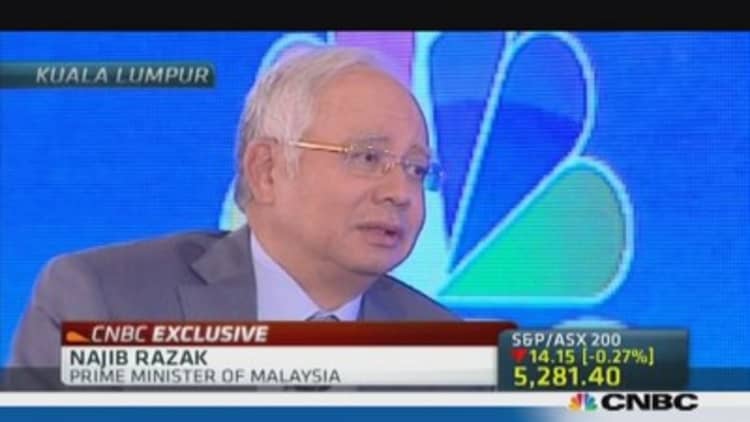
Even in the face of growing debt levels, Malaysia is confident that its fiscal house is in order.
"Most of our debts are domestic and essentially longer term, so the risk of defaulting is quite minimal," said the Malaysian Prime Minister Najib Razak in an exclusive interview with CNBC's Martin Soong in Kuala Lumpur Thursday.
Malaysia's government debt stands at 53 percent of gross domestic product, while its household debt is among Asia's highest. The country is trying to rein in its debt, announcing earlier this month that it will increase fuel prices for the first time since December 2010.
(Read more: Is Malaysian property headed for a Dubai-style crash?)
Malaysia is also widely expected, according to local media reports, to introduce a 4 percent goods and services tax in its upcoming budget in October. Najib declined to comment on that, saying he "would like to keep that surprise for the budget."
Ratings agency Fitch reduced its outlook on Malaysia's rating to negative from stable on July 30, citing worsening public finances and weak prospects for budgetary reform.
Najib is confident that economically, he can fix the deficit, even as capital flows continue to leave Malaysia. He is, however, ruling out imposing capital controls again.
"It's not impossible but it would be our last resort. I believe that we should use other instruments," he said.
Najib cited the country's current strong fundamentals compared to when the Asian financial crisis hit back in 1997. Malaysia's foreign reserves currently stand at $130 billion, compared to below $30 billion back then.
(Read more: Wonder why ringgit's getting crushed?)
Election looms
On the home front, Najib is facing a crucial UMNO (United Malays National Organisation) election in October, where he could see his party leadership challenged. The key contest comes after a divisive general election in May, where his ruling coalition won by a slim margin and lost the popular vote.
Najib however, was confident that he would get the backing of UMNO. "All indications are that the party is solidly behind me and they believe that I should continue leading UMNO and leading the country."
Perhaps to cement that victory, Najib unveiled measures over the weekend to help the economic position of ethnic Malays. The prime minister has come under criticism for the move, raising questions of whether he was the reformer that he branded himself when he took office in 2009.
"This is always a delicate balancing in Malaysia, I don't like to see this as a zero sum game. My helping the Bumiputras (ethnic Malays) doesn't mean that we will exclude the others. It shouldn't be seen in that manner, it shouldn't be seen in the prism of race."
(Read more: Weak Malaysia growth saps post-election euphoria)
On the topic on trade and progressing with the Trans-Pacific Partnership (TPP) talks, Najib said that the country does want to be part of the pact but on Malaysia's terms.
"This is still work in progress, some of the terms go beyond trade and investment considerations, they impinge on questions of sovereignty, they impinge on the question of state-owned enterprises and other factors," he said.
Najib agreed that these were "tough negotiations" but that Malaysia wouldn't sell its soul for the sake of joining TPP.
—By CNBC's Liza Tan. Follow her on Twitter @LizaTanTV
Martin Soong interviewed Prime Minister Najib Razak at the CNBC Summit: Malaysia in Kuala Lumpur yesterday. Catch the interview on "The CNBC Conversation" at 5pm (SG/HK Time) on Friday, and repeated on Saturday and Sunday.

